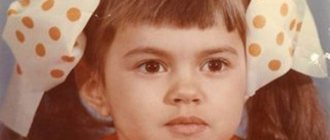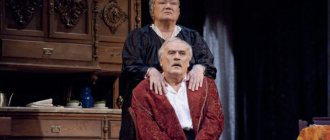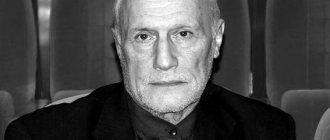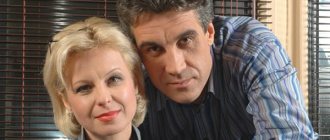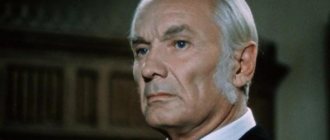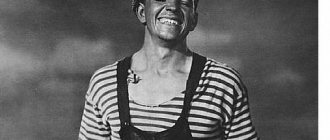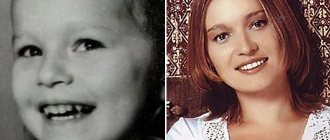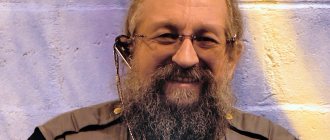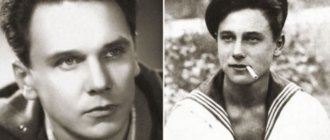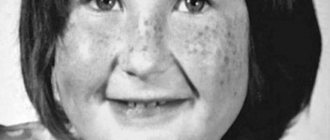Biography of Mikhail Krug
Mikhail Krug (real name Vorobiev) is a Russian bard, performer in the chanson genre and, according to fans, “the king of Russian chanson.” The author of the most popular composition in this genre is the song “Vladimir Central”. His life was cut short by a bullet fired at him in his own home by robbers. For many years, the murder of Krug and his mastermind were unknown, but in 2020, new details appeared in the case that helped identify the killers.
Mikhail Krug - a legend of Russian chanson
Was Mikhail Krug in prison?
Mikhail Krug himself never sat. But he knew this topic very well. So, “Domes,” according to people who knew him closely, is his favorite. “I’d give up the glass right now if they put it in.” This is about Krug, after all. In the last years before his death, he worked like a squirrel running in a wheel. No rest. Popularity took away almost his entire personal life. I couldn't even get a drink. Due to the busy concert schedule, the Krug group was subject to prohibition for three years. Most likely, popularity deprived Krug of his life, among other things. He caused black envy.
The second super hit - “Vladimir Central” - Mikhail Krug dedicated specifically to thief in law Sasha Severny (North). This is a very curious lawyer, the last of the Mohicans” of the true thieves’ stripe. Alexander Severov (according to his passport) spent 29 years behind bars (according to other sources - 20). These years consisted of eight convictions for hooliganism, theft, robbery, possession of weapons and drugs.
Childhood and youth
Mikhail Vladimirovich Vorobyov was born in the city of Kalinin (present-day Tver) on April 7, 1962. His father, Vladimir Mikhailov, worked as an engineer at a carriage factory, and his mother, Zoya Petrovna, worked at a cotton mill. Mikhail became the second child in the Vorobyov family, whose daughter Olga was already growing up.
Little Misha Vorobyov with his mother and sister Olya
Misha Vorobyov spent his childhood and youth in the old proletarian district of the Morozov town, about which he later wrote the song “My Sweet City.” These were ancient barracks, heated with peat. They lived poorly, but amicably. Little Misha was different from the dejected inhabitants of the microdistrict: he constantly joked, amused the adults, and was even more of a tomboy. Later, his father was given an apartment on Ordzhonikidze Street, but the memories of his childhood in the Morozov barracks remained with Mikhail for the rest of his life.
At a music school, the boy learned to play the button accordion, but completed his education. Vorobiev studied poorly at secondary school, and, as his relatives and friends recall, he constantly skipped classes.
Mikhail Krug in childhood
The teachers bombarded the schoolboy Vorobyov with comments: his classmates could have one, maximum two comments, but he once accumulated as many as 47: either he didn’t say hello to the teacher, or he didn’t bring his change. When mom wanted to know the reason for this behavior, Misha took the pose: “I don’t greet her because she’s unfair!” At the age of six, Mikhail first heard the songs of Vladimir Vysotsky and immediately fell in love with the work of this poet and musician. This passion helped Misha fall in love with music. At the age of 11, the boy had already mastered the guitar, and when he was 14, he wrote his first poems, which he dedicated to a classmate. One day at school, Mikhail sang the song of his idol Vysotsky, after which a scandal broke out.
School photo of Mikhail Krug (then Vorobyov)
Having received a matriculation certificate, the future musician went to the Kalinin School and received the profession of a car mechanic there, and then was called up for military service in the Sumy region of Ukraine.
Mikhail Krug in his youth
Upon returning from the army, Mikhail continued to perform songs, imitating Vysotsky. From 1986 to 1993, Vorobiev worked as a driver at various enterprises. He was fired from one of his jobs, at a dairy factory: he lost his temper when he learned that some cans were filled with full-fat milk for party officials, while water was added to the milk in those intended for ordinary residents of Tver. He changed the cans, but the deception was revealed.
Then, for a short time, Mikhail was the head of the city motorcade. He quickly became bored with office work, and he returned to the driver’s seat, where he worked until 1996. By that time, he could already make a living exclusively from music.
Childhood
Mikhail Vladimirovich Vorobyov was born in the city of Kalinin (present-day Tver) on April 7, 1962. His father worked as a civil engineer, and his mother as an accountant. Mikhail became the second child in the Vorobyov family, whose daughter Olga was already growing up. Little Misha Vorobyov with his mother and sister Olya Misha Vorobyov spent his childhood and youth in the old proletarian district, about which he later wrote the song “My Sweet City.” At a music school, the boy learned to play the button accordion, but did not complete his education. Vorobiev was a poor student at secondary school, and, as his relatives and friends recall, he constantly skipped classes. Mikhail Krug in childhood At the age of six, Mikhail first heard the songs of Vladimir Vysotsky and immediately fell in love with the work of this poet and musician. This passion helped Misha fall in love with music. At the age of 11, the boy had already mastered the guitar, and when he was 14, he wrote his first poems, which he dedicated to a classmate. Once at school, Mikhail performed a song by his idol Vysotsky, after which a scandal broke out. School photo of Mikhail Krug (then Vorobyov) Having received his matriculation certificate, the future musician went to the Kalinin School and received the profession of a repairman there, and then was called up for military service to the Sumy region of Ukraine. Mikhail Krug in the army Upon his return from the army, Mikhail continued to perform songs, imitating Vysotsky. From 1986 to 1993, Vorobiev worked as a driver, and after that for a short time he was the head of a city motorcade. He quickly became bored with office work, and he returned to the driver’s seat, where he worked until 1996.
Creative path
In 1987, Mikhail was sent from work to study at the Polytechnic University, which he, however, soon dropped out of.
That same year, he decided to take part in an art song competition, where he performed his composition “About Afghanistan” and took first place. The first victory instilled in him more self-confidence, and he took songwriting seriously. The bard Sergei Klyachkin, who was the chairman of the festival, also pushed him into creativity. The musician appreciated Vorobyov’s talent and told the debutant: “Misha, you need to work...”. The aspiring bard chose the pseudonym Mikhail Krug.
Mikhail Krug in his youth and in the army
Why Circle? We don’t know the exact answer to this question, but we will quote his mother’s words: However, there is an opinion that Mikhail Krug was named after the hero from his favorite Soviet TV series “Resident’s Mistake.”
In 1989, Krug released his first album entitled “Tver Streets”. A year later, a second album appeared called “Katya” and a third without a title at all. However, none of these records were officially released - they were all distributed throughout Russia through piracy. Later, Krug himself re-recorded almost all the compositions from the albums on his next records.
Mikhail Krug - “Zhigan-Limon” In 1994, the artist’s new album, “Zhigan-Limon,” appeared, which became a turning point in the musician’s fate. Despite the fact that the name of the record refers to criminal themes, not only criminal, but also lyrical compositions were recorded on it. “Zhigan-Limona” was subsequently reissued several times, and it was this album that became Mikhail Krug’s symbolic invasion of Russian musical and poetic culture.
In 1994, a documentary film “Bard Mikhail Krug” was made about the musician, which was shown on the “Culture” TV channel only in 1999. For some time, Krug was simply not allowed on television - the musician’s videos began to be broadcast only in 1996. The first audience saw was the video for the song “It Was Yesterday.”
“It Was Yesterday” - Mikhail Krug’s first video Abroad, Mikhail Krug performed for the first time in 1997 - at the Russian Chanson in Germany festival he sang with the Zhemchuzhny brothers. At that concert, Krug performed four songs, one of them – “Madame” – in a guitar version. In the same year, a new soloist, Svetlana Ternova, began working with Mikhail Krug.
In the photo: Mikhail Krug and Svetlana Ternova, his backing vocalist
In 1998, Russian migrants in American cities became acquainted with the work of the Russian performer, and in 2000 the musician toured Israel. Mikhail Krug very often gave charity concerts and performed for free in prisons. Usually Krug sang songs of his own authorship, but a number of compositions were written for him by Alexander Belolebedinsky. These are “I passed Siberia”, “The process is over”, “Hello, Mom”, “Sparks in the fireplace”, “Cry, violin (In every city)”, “Chaim” and “Student”. These songs were previously performed by Arkady Severny. But “Svetochka” was written by Leonid Efremov - Krug only slightly changed the original text.
Songs of the Circle - the personification of thieves' romance
The most popular and beloved among fans was Mikhail’s song “Vladimir Central”, which became one of the most famous compositions of Russian chanson in general. The song was first performed in the album “Madame” (1998). There is an assumption that it is dedicated to thief in law Sasha Severny. Mikhail Krug - “Vladimir Central” (concert at Luzhniki, 2000) In March 1998, Mikhail Krug received the “Ovation” award in the “Russian Chanson” category. And in the fall of 1999, the musician entered the “Music Ring” together with Sergei Trofimov and defeated his colleague in a friendly duel. In the same year, the singer took second place in the Russian Chanson competition. At that time, he became one of the most popular artists in the country, although the attitude towards his work among different circles of society was ambiguous - the creative intelligentsia called the success of the Circle a symbol of the crisis of Russian culture in difficult times for the country.
Life line
April 7, 1962 Date of birth of Mikhail Vladimirovich Krug (real name - Vorobiev). 1987 Admission to college, marriage to his first wife Svetlana, participation in an art song competition. 1988 Birth of son Dmitry. 1989 Divorce from Svetlana, recording of the first album “Tver Streets”. 1994 Release of the album “Zhigan-Limon”. 1996 Premiere of Mikhail Krug’s first video on television. 1997 Performance at the “Russian Chanson in Germany” festival. 1998 Performance in the USA. March 27, 1998 Ovation Award in the Russian Chanson category. 2000 Marriage with Irina Glazko, tour of Israel, role in the film “April”. 2002 Birth of son Alexander. July 1, 2002 Date of death of Mikhail Krug. July 3, 2002 Civil memorial service, funeral service and funeral of Mikhail Krug.
Personal life of Mikhail Krug
Mikhail Krug's first love was called Marina. The young man spent all the pennies he earned on her. She promised to wait for him from the army, but did not keep her word. Mikhail got married for the first time after serving in the army. The wife's name was Svetlana. She was a seamstress, and they met through a mutual friend. But family life was short-lived: the wife did not like that her husband often came home drunk, and her intelligent parents never tired of reminding her that a vocational school graduate was not a match for her. In 1988, Mikhail Krug divorced his wife and sued her son Dmitry - he decided to raise the child on his own.
Mikhail Krug with his first wife and son Dmitry
In 2000, Krug married for the second time. His chosen one was a waitress from Chelyabinsk Irina, with whom he, a restaurant client, fell in love at first sight. In order to constantly be close to this beautiful woman, the musician offered her a job as a costume designer, but at first the girl refused. But, after weighing all the pros and cons, Irina later accepted the job offer and for a year simply carried out her tasks and toured with the Circle. The musician rented her a one-room apartment in Moscow and helped her financially in every possible way.
Mikhail and Irina Krug in their youth (right: Irina and their son Sasha)
Finally, in 2001, Irina married Mikhail. She already had a daughter from another marriage, Marina, whom Krug took under his wing and began to raise as his own. In 2002, the family had a common child - son Alexander.
Photo from the family archive of Mikhail Krug
By the way, the musician was an adherent of monarchist political beliefs, a conservative and a homophobe, supported the Domostroevsky way of life in the family and had an aversion to feminism. He considered the Russian stage to be “dominated by people of non-traditional sexual orientation.” Krug was a member of the LDPR and one of the assistants to its leader Vladimir Zhirinovsky.
Spouses on vacation
Instagram and Wikipedia Mikhail Krug
Back in 2002, when Krug was killed, few people knew about Wikipedia, much less there was such a thing as Instagram, so it’s quite difficult to talk about Mikhail Krug’s Instagram and Wikipedia. Of course, he ended up on the page of the most popular encyclopedia on the Internet.
Krug's Wikipedia page contains detailed information about his work and contribution to the development of Chanson in Russia. Krug’s widow, Irina, actively uses Instagram; a sad post appeared there on the 15th anniversary of the artist’s death, and most recently she boasted of her handsome son, who, according to many subscribers to Irina’s account, took after his father.
Death
On the night of June 30 to July 1, 2002, in the Tver village of Mamulino, the artist’s house was attacked. At that moment, in addition to the singer, his wife, mother-in-law and children were in the house. Two unknown men entered the third floor of the house, attacked the artist’s mother-in-law and began to injure her. Krug himself and his wife Irina came running to the woman’s screams. Then the criminals opened fire on them. Irina was able to escape, and Mikhail, who protected her from the bullets, received two serious wounds and lost consciousness. In the confusion, the attackers managed to escape, finally shooting the dog.
Mikhail Krug was shot dead in his house near Tver
The circle came to its senses and was able to get to neighbor Vadim Rusakov, where Irina had fled. The man took the musician to the Tver City Hospital. At this time, the police were already working at the scene, and doctors were helping the musician’s mother-in-law. Fortunately, the children were not harmed. The farewell service took place on July 3. The whole world saw off the musician on his last journey. Not only colleagues, but also government officials came to say goodbye. The funeral ceremony stretched for several kilometers. Mikhail Krug was buried at the Dmitrovo-Cherkassky cemetery.
Mikhail Krug's grave
Consequences and memory
After the death of her husband, Irina began performing under the pseudonym Irina Krug. Most of her repertoire are songs dedicated to the memory of her late husband. Irina Krug - You, my last love Mikhail's eldest son, Dmitry Vorobyov, was barely 14 when the bard was killed. Relatives were worried that the loss of his father would have a negative impact on the teenager and decided to transfer him to the cadet corps. Of course, at first the boy did not understand why such a punishment would be given to a man who had just lost his father? But he quickly got involved and even fell in love with cadet life. Subsequently, he graduated with honors from the St. Petersburg University of the Ministry of Internal Affairs and became a policeman.
Dmitry Vorobyov, the eldest son of Mikhail Krug, works in the police
Dmitry is similar to his father in appearance, but not in character: he is a very reserved person, does not play the guitar, does not sing, and avoids communicating with the press. However, relatives say that he changes around those close to him: he jokes, smiles, and is always ready to help.
The youngest son of Mikhail Krug, Alexander, does not remember his father, nor does he remember that ill-fated night. According to the press, the boy officially took the surname Krug, as his mother Irina wanted. Unlike his brother, Sasha loves attention: he runs Instagram, which has several thousand subscribers, and sometimes participates in talk shows. Outwardly, he clearly took after his mother.
Sasha Krug, youngest son of Mikhail Krug
In 2007, a bronze monument was erected to Mikhail Krug on Radishchev Boulevard in Tver. A Russian bard and chansonnier sits on a bench and leans his hands on a guitar, next to him there is a free place where anyone can sit and take a photo. Funds for the installation of the monument were raised by the Mikhail Krug Foundation, which was headed by his older sister, Olga Medvedeva.
Monument to the Circle in Tver (Radishcheva Boulevard, 21)
Investigation into the murder of Krug
A variety of versions of the murder appeared one after another.
Producer Vadim Tsyganov suggested that it was a banal robbery attempt. On the eve of the murder, the musician, together with Vika Tsyganova, Vadim’s wife, recorded the record “Vladimir Central-2” and was supposed to receive a large fee. According to another version, the artist became the victim of a planned and, possibly, even a contract murder. The case of the musician’s murder got off the ground only in 2008: the Tver Wolves gang, which may have been involved in the murder of Krug, was arrested in Tver. One of its participants, Alexander Ageev, was identified by the musician’s widow Irina as the killer of her husband. However, his involvement could not be proven. Ageev received a life sentence, but for other crimes. The case was suspended out of despair.
Mikhail Krug: murder solved? 2020 brought new clues. An investigative experiment was conducted in Krug's house. Two members of the Tver Wolves gang, Dmitry Veselov and the same Ageev, testified. It turned out that one of the local crime bosses, nicknamed Lom, gave them the order to rob Mikhail Krug. He believed that the chansonnier’s modest house was stuffed with antiques and jewelry.
Alexander Ageev
The bandits thought that no one was home, but in the midst of searching for the valuables, Mikhail’s family returned home. The criminals hid on the top floor and were taken by surprise by Mikhail's mother-in-law. The men hit her with the butt of a pistol and tried to escape, but on the way out they ran into Krug. Fleeing, Veselov shot the musician twice. The wound turned out to be fatal.
Dmitry Veselov, the killer of Mikhail Krug
Veselov, is no longer alive. A year later, he was shot by another member of the Tver Wolves, an admirer of Mikhail Krug’s work, Alexey Osinov. He is now serving a life sentence. Since Ageev is already serving a life sentence, and also due to the expiration of the statute of limitations for attempted theft (his offense was included in this article), his punishment has not changed. The criminal case has been discontinued. Mikhail’s mother never found out the names of her son’s killers - she died of a heart attack in January 2020. Irina Krug thanked the Investigative Committee staff for solving the case.

